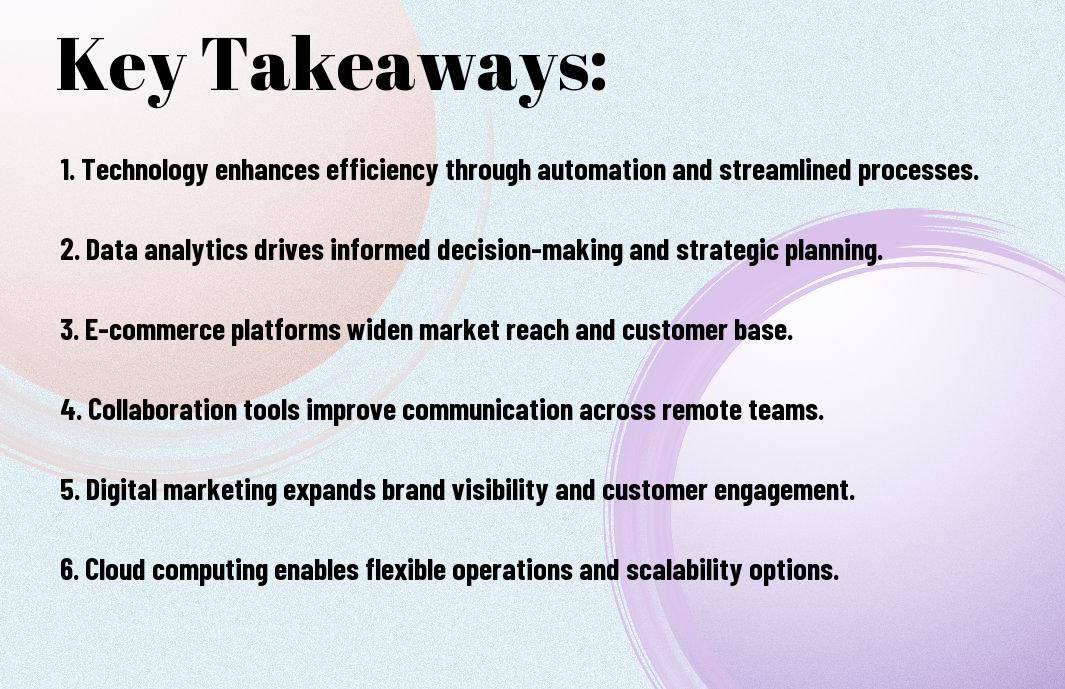Over the past decade, technology has transformed the way you approach business expansion, enabling you to reach new markets and streamline operations. From data analytics that inform strategic decisions to digital marketing tools that enhance customer engagement, your understanding of these innovations can significantly impact your growth trajectory. Embracing technology not only optimizes efficiency but also provides valuable insights into consumer behavior, allowing you to adapt and thrive in an ever-evolving business landscape. In this post, you’ll explore key technological advancements that can elevate your business expansion efforts.

Key Takeaways:
- Global Reach: Technology enables businesses to operate in multiple markets, connecting with customers across the globe.
- Efficiency & Productivity: Automation and software solutions streamline operations, reducing time and costs associated with manual processes.
- Data Analytics: Access to advanced analytics tools allows businesses to make informed decisions based on market trends and customer behavior.
- Enhanced Communication: Online platforms facilitate instant communication with teams and clients, improving collaboration irrespective of location.
- Scalability: Technology solutions can be easily adapted to support business growth, ensuring that infrastructure can expand alongside demand.

Understanding Business Expansion
Your journey in understanding business expansion starts with recognizing its significance in achieving sustainable growth. Leveraging technology can significantly enhance this process. Explore the 5 advantages of technology in your business strategy to gain insights that help you navigate expansion effectively.
Definition and Importance
On your path to growth, business expansion refers to the strategies and initiatives aimed at increasing your market reach, product offerings, or customer base. It is important for ensuring long-term sustainability and competitiveness in today’s dynamic marketplace.
Types of Business Expansion
For businesses considering expansion, there are several avenues available. Here’s a table breaking down the main types:
| Type | Description |
|---|---|
| Market Penetration | Increasing sales of existing products in existing markets. |
| Market Development | Introducing existing products to new markets. |
| Product Development | Creating new products for existing markets. |
| Diversification | Entering new markets with new products. |
| Franchising | Allowing others to operate businesses under your brand. |
Knowing these types allows you to align your strategies with market needs and maximize potential. Consider them when planning your next steps.
With each type of business expansion, you have unique opportunities to explore and leverage. Let’s examine each option closely:
| Type | Benefits |
|---|---|
| Market Penetration | Increased market share with minimal risk. |
| Market Development | Access to new customer demographics. |
| Product Development | Innovation to meet changing customer preferences. |
| Diversification | Reduced risk through multiple revenue sources. |
| Franchising | Rapid expansion with lowered initial investment. |
Knowing the benefits helps you tailor your approach to expansion in a way that meets your business goals effectively.
The Impact of Technology on Business Growth
If you want your business to flourish, embracing technology is vital. Modern innovations provide tools that streamline processes, improve communication, and enhance customer engagement, all of which contribute significantly to your growth. From online marketing strategies to cloud-based collaboration tools, technology enables you to reach wider audiences and operate more efficiently, giving you a competitive edge in today’s market.
Automation and Efficiency
An effective way to enhance your business operations is through automation. By implementing automated systems, you can reduce manual tasks, minimize errors, and free up valuable time for you and your team to focus on strategic initiatives. This not only improves your operational efficiency but also boosts overall productivity, allowing your business to grow faster without the need for proportional increases in resources.
Data Analytics for Strategic Decision Making
Along with automation, leveraging data analytics can significantly impact your decision-making process. By analyzing relevant data, you gain insights that support informed choices, helping you identify opportunities for growth and optimize operations. This analytical approach helps you address challenges proactively and allocate resources more effectively, ultimately driving your business forward.
Consequently, utilizing data analytics enables you to adapt to changing market conditions and consumer preferences, fostering sustainable growth. With access to real-time data and advanced analytical tools, you can track performance metrics, forecast trends, and evaluate the effectiveness of marketing initiatives. This informed perspective allows you to refine your strategies and pivot when necessary, ensuring your business remains agile and responsive in a competitive landscape.
Digital Marketing and Customer Engagement
Keep in mind that embracing digital marketing strategies is necessary for business expansion. By effectively utilizing these tools, you can engage your audience more meaningfully and convert leads into loyal customers. Explore The Role of Current Technology in Business Growth and Expansion to learn how to streamline your marketing efforts for optimal results.
Leveraging Social Media
Engagement with potential and current customers on social media platforms is necessary for showcasing your brand and fostering community. By sharing valuable content and responding to inquiries, you can create lasting relationships that enhance customer loyalty. Utilize analytics tools to track effectiveness and adjust your strategy to meet your audience’s preferences.
E-commerce Platforms and Online Sales
Digital avenues such as e-commerce platforms enable you to reach a broader audience, resulting in increased sales potential. By establishing a solid online presence, you can tap into the growing market of consumers who prefer shopping from home.
For instance, popular platforms like Shopify and WooCommerce provide user-friendly interfaces that allow you to set up an online store quickly. By integrating payment processing and inventory management, you streamline operations, making it easier for customers to make purchases. Enhanced user experience through attractive layouts and mobile optimization can significantly improve your conversion rates, helping you expand your business effectively in the digital landscape.
Global Reach through Technology
Not every business has to settle for local customers anymore. With the right technology, you can easily connect with clients around the globe. Adopting innovative strategies such as digital marketing and e-commerce can significantly enhance your ABM Agency: Technology & Innovation In Business Growth, allowing you to tap into new demographics and markets that were previously out of reach.
Expanding into New Markets
Across various sectors, technology facilitates your entry into new markets by providing data-driven insights and automating processes that streamline operations. Engaging with global audiences becomes effortless when you leverage tools that analyze customer preferences and behaviors, giving you a competitive edge in unfamiliar territories.
The Role of Communication Technology
Between different time zones and languages, maintaining clear communication with international teams and customers is vital for your success in foreign markets. Effective communication technology bridges these gaps, ensuring you stay connected, share important updates, and address queries in a timely manner.
A well-implemented communication system empowers you to foster relationships and collaborate seamlessly with partners and customers worldwide. Tools such as video conferencing, chat applications, and project management software allow you to build trust and understanding, which are imperative components in establishing a solid presence in new markets. By enhancing your communication capabilities, you are better positioned to adapt to challenges and seize opportunities that arise from global interactions.
Challenges of Technology Integration
To successfully integrate technology into your business expansion strategy, you must navigate various challenges. Resistance to change among employees can impede progress, while the need for training and skill development presents additional obstacles. Additionally, aligning new technological solutions with existing processes is necessary to ensure smooth operations. Attention to these challenges can help you leverage technology’s benefits while minimizing disruptions.
Cost Implications
Above all, the financial investment required for technology integration can be significant. You may face initial costs related to purchasing software and hardware, as well as ongoing expenses for maintenance and updates. Budgeting for these technological expenditures is necessary to avoid financial strain while still capitalizing on new opportunities for growth.
Cybersecurity Concerns
At the forefront of technology integration are the cybersecurity challenges that you must address. As you adopt new systems and software, the risk of potential cyber threats increases, making it necessary to protect your sensitive data and assets. Failure to implement robust security measures can lead to costly breaches and loss of customer trust.
Considering the ever-evolving landscape of cyber threats, it is vital for you to adopt a proactive approach towards cybersecurity. This includes establishing comprehensive security protocols, training your staff on best practices, and continuously monitoring your systems for vulnerabilities. Investing in cybersecurity solutions not only safeguards your business but also reinforces customer confidence in your brand as you expand your operations.
Case Studies of Successful Technology-Driven Expansion
Despite the challenges businesses face, numerous companies have leveraged technology to successfully expand their operations. By analyzing these case studies, you can gain insights into how technology can be your ally in growth. Here are a few notable examples:
- Shopify: Grew from 2 to over 1.7 million businesses globally, achieving $4.61 billion in revenue in 2022.
- Airbnb: Expanded to over 220 countries with more than 7 million listings, generating over $4.8 billion in revenue in 2021.
- Amazon: Increased its market presence across 15 countries, yielding a staggering $469.8 billion in sales in 2021.
- Zoom: Surged from 10 million daily meeting participants in December 2019 to over 300 million by April 2020.
- Netflix: Grew its user base from 190,000 in 2007 to over 230 million subscribers by Q3 2023.
These case studies illustrate the power of integrating technology in your business strategy, highlighting pathways to sector leadership and financial success.
To wrap up
So, as you evaluate the role of technology in your business expansion efforts, it’s important to embrace the digital tools at your disposal. They not only streamline operations but also enhance customer engagement, open new markets, and boost overall efficiency. By staying informed and adapting to the latest technological trends, you can position your business for sustainable growth and better competitive advantage in today’s dynamic landscape.
Q: How does technology facilitate market research for business expansion?
A: Technology plays a significant role in gathering and analyzing market data. Businesses can utilize tools such as survey platforms, social media analytics, and customer relationship management (CRM) systems to gain insight into consumer preferences and market trends. These technologies allow for real-time data analysis, enabling companies to make informed decisions about which new markets to enter or which products to develop. Additionally, geographic information systems (GIS) can assist businesses in identifying target demographics and optimal locations for expansion.
Q: In what ways can technology enhance operational efficiency during business expansion?
A: As businesses expand, maintaining operational efficiency becomes paramount. Technology can streamline processes through automation, reducing the time and labor involved in various tasks. Tools like project management software enable better coordination among teams and clearer communication, which is vital during expansion. Furthermore, cloud-based solutions allow for real-time collaboration across different geographical locations, helping teams maintain productivity and adhere to deadlines despite the challenges of managing new operations.
Q: What role does digital marketing play in business expansion through technology?
A: Digital marketing is crucial for reaching new audiences during business expansion. Technologies such as search engine optimization (SEO), pay-per-click advertising, and social media campaigns enable companies to effectively promote their offerings to potential customers in new markets. With analytics tools, businesses can track the effectiveness of their marketing efforts and adjust strategies based on audience engagement and feedback. This data-driven approach helps maximize the return on investment and can lead to successful market penetration.

